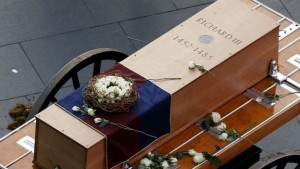
This week really is Richard III week and it kicked off yesterday with Richard III’s final journey to Leicester Cathedral.
The hearse carrying Richard III’s remains, which were in a lead envelope inside a coffin made of English oak by Michael Ibsen, a descendant of Anne of York, travelled from the University of Leicester to the Cathedral on a route which included places that had historical links to Richard III. At Bosworth Battlefield Heritage Centre, there was a service and a 21 gun-salute, and there were also services/ceremonies at Fenn Lane Farm, Sutton Cheney, Market Bosworth and St Nicholas Church.
After Richard III’s remains were received at Leicester Cathedral, there was an evening service of Compline with a sermon preached by Cardinal Vincent Nichols, the Catholic Archbishop of Westminster.
For those of you who were unable to watch the live coverage of yesterday’s procession and services, you can watch videos and browse photos at the following links:
- BBC Leicester – http://www.bbc.com/news/uk-england-leicestershire-31990721 and https://www.facebook.com/bbcleicester?fref=ts
- Richard III Leicester – https://www.facebook.com/kingrichardleicester?fref=ts and http://kingrichardinleicester.com/
- The Telegraph “The burial of Richard III: viewer’s guide” – http://www.telegraph.co.uk/culture/tvandradio/11488151/The-burial-of-Richard-III-viewers-guide.html
- The Guardian “Richard III reburial: ‘May you rest in peace in Leicester'” – http://www.theguardian.com/uk-news/2015/mar/22/king-richard-iii-reburial-rest-in-peace-leicester
You can download a copy of the Richard III Reinterment Week Programme at http://www.visitleicester.info/things-to-see-and-do/richard-iii/reinterment/, but here is a list of the main events in Leicester:
- Monday 23rd March – Leicester Cathedral open 9.30am-12.30pm and 2pm-5pm for viewing of Richard III’s coffin. 5pm – Requiem Mass for the repose of the soul of Richard III, at Holy Cross Church, the Catholic parish church and Dominican priory, Wellington Street, Leicester.
- Tuesday 24th March – Leicester Cathedral open 9.30am-12.30pm and 2pm-5pm for viewing of Richard III’s coffin. 5.30pm – Vespers sung by the Dominican friars in Leicester Cathedral.
- Wednesday 25th March – Leicester Cathedral open 9.30am-12.30pm for viewing of Richard III’s coffin.
- Thursday 26th March – Richard III’s Reinterment. 10.45am – Procession of significant guests from Leicester Guildhall to Leicester Cathedral. 11.30am – Service of Reinterment of the Remains of King Richard III in the presence of the Most Right Reverend Justin Welby, Archbishop of Canterbury and senior clergy from both dioceses, and other Christian denominations alongside representatives of the World Faiths.
- Friday 27th March – Service of Reveal of the Tomb and Celebration for King Richard III. 3pm – 5.15pm
& 6.15pm – 9pm – Richard III’s sealed tomb will be on display to the public. 6pm – A special Richard III peal of the bells at the Cathedral.
There are more events mention in the programme. The Richard III Society has organised events for Reinterment Week – see http://www.richardiii.net/reinterment.php for more details – as has Bosworth Battlefield and Heritage Centre – see http://bosworthbattlefield.blogspot.co.uk/p/king-richard-iii-s-reinterment.html.